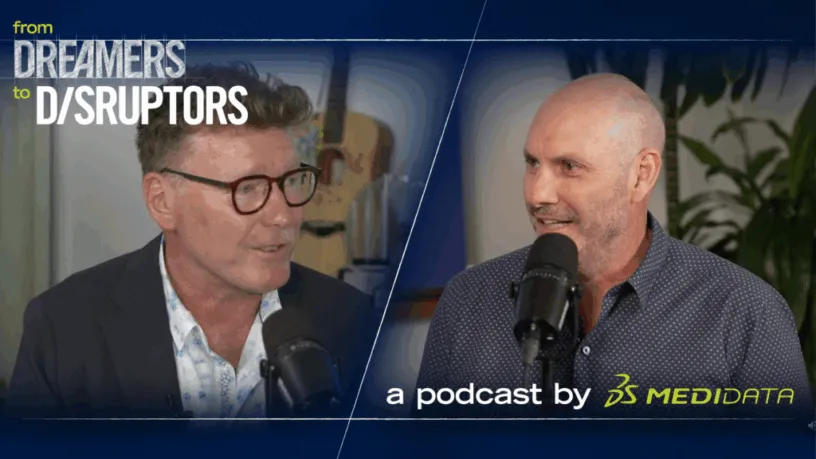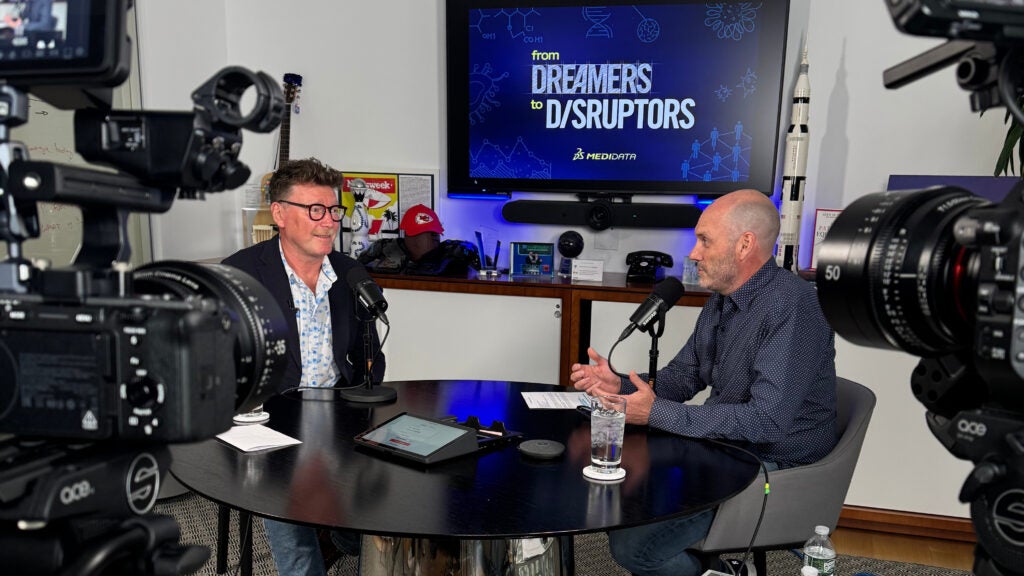CNS Research: Future Trends & Clinical Trial Innovations with Brad O’Connor | from Dreamers to Disruptors

Welcome to the Clinical Minds “Innovator Insights Corner,” where we’ll be sharing fascinating stories, perspectives, and predictions from the guests of ‘from Dreamers to Disruptors’, a podcast by Medidata exploring life sciences innovation and the visionaries behind it all.
The 21st century has seen our understanding of heart disease and cancer grow exponentially, enabling the development of cutting-edge treatments that significantly improve survival rates. The resultant increase in life expectancy is shining the spotlight on central nervous system (CNS) conditions, as more people live long enough to grapple with the effects of Alzheimer’s disease and other forms of dementia.
CNS research is, relatively speaking, still in its infancy; and it’s up to clinical researchers to advance our ability to detect and treat dementia as it becomes a mounting concern across the world.

When it comes to CNS research, few people are better informed than Brad O’Connor. As CEO of Cogstate for over 20 years, Brad has stood at the forefront of the latest developments in testing and treatment. Our CEO Anthony Costello sat down with him to discuss the breakthroughs shaping CNS research—from digital cognitive assessments to blood-based biomarkers and beyond.
A Universal Dementia Test
A key challenge when assessing patients for dementia is the huge variation across different regions and customs. A blood test is the same fundamental process whether you're in Indiana or India, but assessing patients’ cognition requires us to be sensitive to differences in language, culture, and the actions of the clinician performing the test. This makes it much more challenging to capture uniform data for large CNS clinical trials.
“The difficulty in clinical drug trials for central nervous system disease, and the measurement of cognition, is that you're trying to do a standardized assessment across 20 countries, 30 languages, and 100 different clinicians administering the tests.”
– Brad O’Connor
Cogstate has been working for decades to develop universal assessments. Early tests used a simple deck of playing cards. “As a paradigm that was well understood in different languages and different cultures,” says Brad, “You didn't have to translate anything.” These tests have continued to evolve, resulting in web- and app-based digital cognitive assessments that leverage cloud and emerging technologies for use across different devices to deliver standardized results.
A key focus in the evolution of cognitive tests is the detection and reduction of error. Refining the tools and investing in better training ensures that the doctors conducting assessments are all using the same methods, that mistakes or deviations can be detected, and that tests can be continuously refined to deliver better, more accurate results.
Early Detection and Diagnosis: A New Approach to Alzheimer’s
While newer and better treatments—and the ultimate pursuit of a cure for Alzheimer’s and other forms of dementia—are a key focus of CNS research, it also encompasses other goals. Developing better assessments that allow for earlier detection and diagnosis will let us treat the root causes of these conditions sooner. Delaying the effects of cognitive decline will help us extend the number of years that people can live healthily—an idea that Brad calls “health span.”
Our growing understanding of CNS conditions, combined with the explosion in mobile devices and personal sensors that track our health metrics, promises a future for cognitive monitoring in which symptoms that we might not notice are detected and flagged—so treatment can begin much earlier.
“We think these kinds of cognitive assessments should be as commonplace as many other tests, like a cholesterol test or a blood pressure test.”
– Anthony Costello
“We’re talking about passive measures, where we're just monitoring in the background and noticing changes in behavior,” says Brad. “It’s the idea of having your phone or your watch monitoring a whole bunch of things and saying, ‘Something's wrong, why don't you take this cognitive test so we can control it?’ The advice may be as simple as, ‘Why don’t you go see your doctor to talk about this?’”
Armed with a better understanding of our cognitive health and earlier detection of any symptoms, we can introduce treatments and simple lifestyle changes that will delay the onset of cognitive decline, extending both life spans and health spans for us all.
The Rise of CNS Biomarkers
Our ability to detect and diagnose Alzheimer’s is key to ensuring better outcomes for patients. Researchers have been making incredible progress in identifying the biomarkers that indicate the seeds of neurological changes within a patient—potentially long before any symptoms emerge.
A key biomarker for Alzheimer’s is the buildup of amyloid plaques in the brain. As the presence of these plaques increases, they begin to affect cognitive function, eventually leading to dementia.
“In May, the FDA approved the first-ever [Alzheimer’s] biomarker, a blood-based test that will measure the amount of plaques that people have in their brain,” says Brad. “That's a complete game-changer, because now we can know what's happening in your brain just by taking blood.”
“Solanezumab is one of the highest profile failures of a Phase III Alzheimer's disease trial. At the time that trial was designed and conducted, we didn't have the ability to measure amyloid plaques in the brain. The post hoc analysis showed us that something like 30% of the patients who enrolled in that trial didn't have amyloid. No wonder the trial was not successful.”
– Brad O’Connor
The superior testing enabled by biomarkers will also support the accelerated development of treatments. This deeper understanding allows for better control of the variables in a clinical trial, allowing us to design more reliable studies. If CNS trials become less of a risk for pharmaceutical companies, they’ll be more confident about embarking on them. More investment will flow, helping to develop new generations of Alzheimer’s treatments.
“As we're making these more informed decisions, and we have a better idea of what's actually happening and the mechanism of action, we're seeing greater success levels,” says Brad. “As the success ramps up, the R&D ramps up.”
Listen to Brad and Anthony’s full conversation in from Dreamers to Disruptors Episode 2 to dive deeper into the considerations around CNS research and the cutting-edge developments creating better outcomes for people with dementia.
Contact Us


